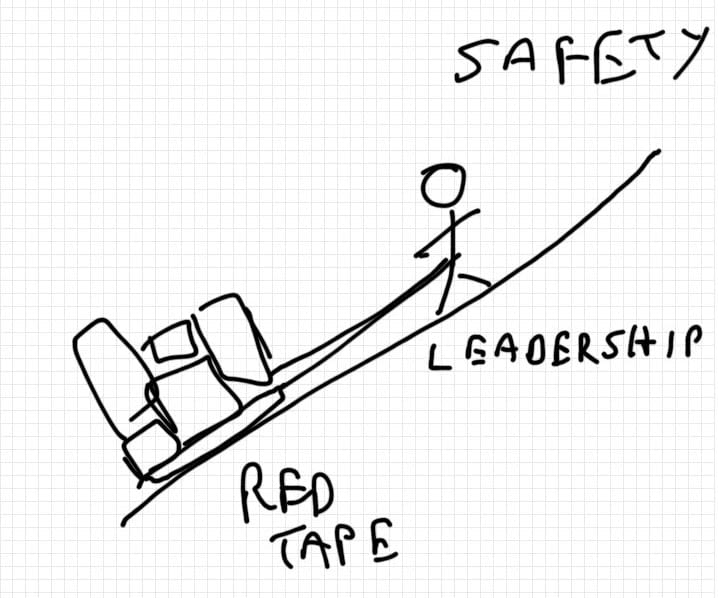The BP Deepwater Horizon disaster has faded to become another safety leadership failure to be discussed in the OHS and risk management courses but some new research ($ paywall) in Critical Perspectives on Accounting provides a fresh perspective on BP’s safety culture and leadership prior to the major disaster by deconstructing the speeches of the the then-CEO, Tony Hayward.
Tag: Leadership
Podcast tackles Safety Culture
 The latest episode of the Cabbage Salad and Safety podcast is now available and includes a discussion on the perennial occupational health and safety (OHS) debate over Safety Culture.
The latest episode of the Cabbage Salad and Safety podcast is now available and includes a discussion on the perennial occupational health and safety (OHS) debate over Safety Culture.
Siobhan Flores-Walsh and I discuss the role of safety culture and its influence on contemporary safety management. The definition is fluffy and this is part of the challenge in improving a company’s safety culture. I think the podcast episode is a useful primer on the issue to those who are just making contact with the concept and of interest to those of us who are already dealing with safety culture and people’s expectations for it.
Cabbage Salad and Safety podcasts are changing all the time and we read all the feedback and comments that listeners have emailed in. Please have a listen and email me your thoughts for future episodes or please comment below if you prefer.
Don’t kill anyone. Don’t seriously injure anyone.
 Michael Tooma (pictured right) has been a leading writer on occupational health and safety (OHS) law in Australia for some time. He is one of the few labour lawyers who is not afraid to express an opinion although he has always spoken within the legal context.
Michael Tooma (pictured right) has been a leading writer on occupational health and safety (OHS) law in Australia for some time. He is one of the few labour lawyers who is not afraid to express an opinion although he has always spoken within the legal context.
Recently Tooma participated in a roadshow with
How can an OHS regulator get the management of its own staff so wrong?
How can an OHS regulator get the management of its own staff so wrong?
In June 2014, a NSW Parliamentary inquiry released its final report into Allegations of bullying in WorkCover NSW, that State’s occupational health and safety (OHS) regulator. The report found that
“…Workcover has a significant organisational problem with bullying. This problem is a longstanding one and operates at a cultural level.” (page x)
The Committee Chairman Hon Fred Nile MLC, wrote that
“more effective leadership and governance is essential.” (page x)
Longstanding bullying problems? Problems with leadership and governance? Many companies and public sector organisations have had similar issues ambulances, police, fire services, research organisations, to name a few, and are working them through. What happened in New South Wales?
GlencoreXstrata’s annual report shows more than 26 deaths
Last week the Australian Financial Review (AFR) brought some focus on occupational health and safety (OHS) by reporting on the most recent annual report from GlencoreXstrata in its article “Mining’s not war, why 26 deaths?” (subscription required). The article is enlightening but as important is that a business newspaper has analysed an annual report in a workplace safety context. Curiously, although OHS is often mentioned as part of its sustainability and risk management program, safety is not seen as a financial key performance indicator, and it should be.
AFR’s Matthew Stevens wrote:
“Everybody in mining talks about ‘zero harm’ being the ultimate ambition of their health and safety programs. But talking safe and living safe are two very different things.”
GlencoreXstrata’s 2013 annual report is worth a look to both verify the AFR’s quotes but also to see the corporate context in which fatality statements are stated. The crux of the AFR article is this statement from the Chairman’s introduction:
“It is with deep sadness that I must report the loss of 26 lives at our combined operations during 2013. Any fatality is totally unacceptable and one of the Board’s main objectives is to bring about lasting improvements to our safety culture.” (page 76)
(A curious sidenote is that the interim Chairman is Dr Anthony Howard, formally of BP and brought to prominence by the Deepwater Horizon oil spill.) Continue reading “GlencoreXstrata’s annual report shows more than 26 deaths”
Safety leadership and the red tape drag
 During a recent seminar I produced the doodle on the right, which depicts what I think the speaker was talking about. Safety is a goal that can be best achieved through improving a company’s leadership qualities. However all companies seem to be restricted by red tape, however one defines that. Can this journey be improved?
During a recent seminar I produced the doodle on the right, which depicts what I think the speaker was talking about. Safety is a goal that can be best achieved through improving a company’s leadership qualities. However all companies seem to be restricted by red tape, however one defines that. Can this journey be improved?
Decrease the baggage
It may be possible to reduce or minimise the red tape baggage. Most Western governments are attempting this through inquiries and reviews but this is assuming that it is government bureaucracy that has created this baggage. In Australia over the last fifty years Governments have allowed business great flexibility in how it achieves OHS compliance and safe workplaces (definitely not the same thing) by reducing the prescriptive basis of OHS laws. It may have been reasonable to expect that the loss of prescriptive safety would decrease paperwork but over the same time there has been increasing calls for less red tape from government. Continue reading “Safety leadership and the red tape drag”
New political challenges for OHS in Australia
This weekend the Australian people voted for the conservative Liberal Party to be the next Federal government. Workplace safety has been largely absent from the pre-election campaign but when it has been mentioned it has almost always been couched in terms of productivity. In the next few years, workplace safety issues must be couched in terms of productivity to have any hope of gaining the ear of the new government and, particularly, the ear of Senator Eric Abetz, the most likely candidate for the ministry of workplace relations.
Workplace Bullying
Recent changes to workplace bullying laws which provide a prominent role of the Fair Work Commission are unlikely to be rolled back but Abetz has promised Continue reading “New political challenges for OHS in Australia”

